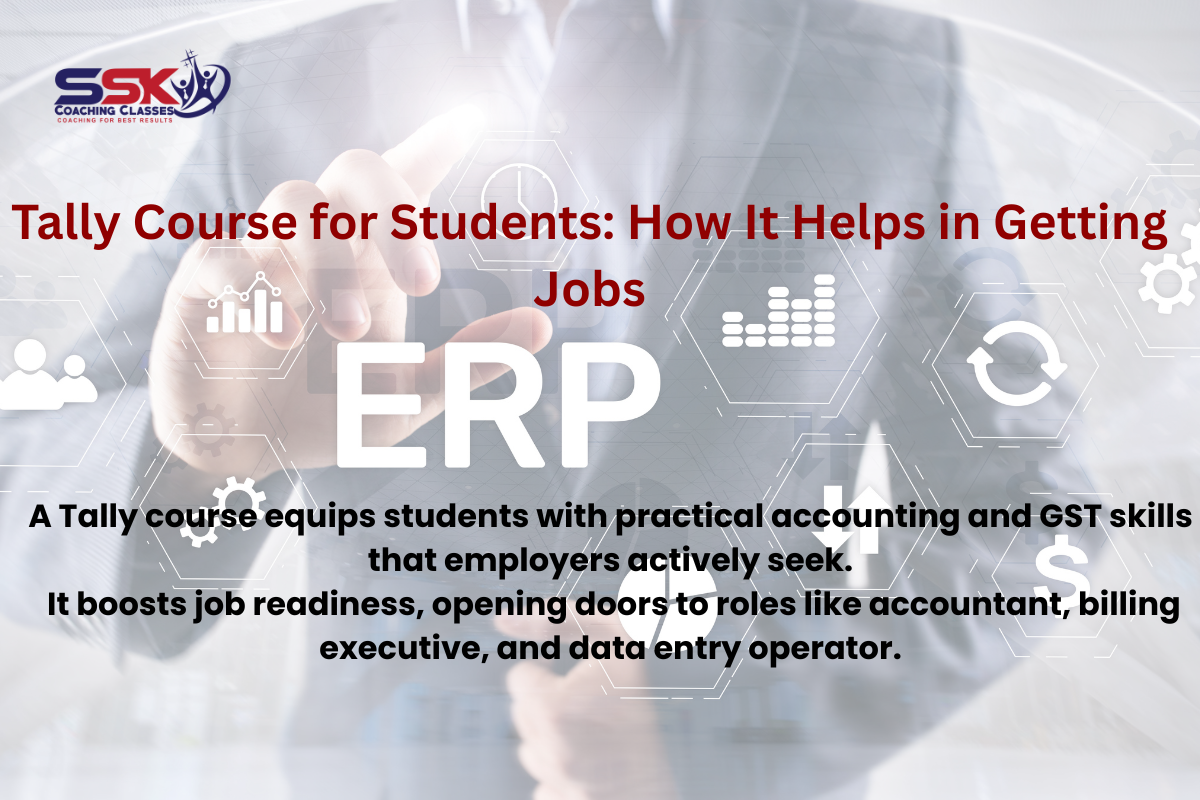In today’s competitive job market, students need more than a degree to stand out — they require practical skills that employers value. One such skill is proficiency in Tally, a widely used accounting software in India and many other countries. From small businesses to large corporates, Tally simplifies bookkeeping, financial reporting, GST compliance, payroll, and more. A Tally course equips students with hands-on knowledge of these features, boosting their employability and giving them an edge over peers.
This blog explores the ways in which undertaking a Tally course can enhance a student’s job prospects — spanning essential skills acquisition, industry relevance, certification benefits, career pathways, and real-world impact. Whether you are pursuing commerce, business studies, or vocational training, the insights below will show why adding Tally to your skillset could be one of the smartest career moves you make.
Understanding Tally: What Is It and Why It Matters? (~200 words)
What is Tally?
Tally (originally “Tally Solutions”) is an accounting and business management software widely used across Indian businesses for over two decades. The latest version, TallyPrime, offers features like ledger management, voucher entry, inventory handling, invoicing, payroll, multi-user access, and advanced GST capabilities.
Why is Tally Significant?
- Ubiquity: From kirana stores to corporates, Tally is a staple for accounting.
- Compliance: With evolving GST norms, businesses rely on Tally for accurate tax filing.
- Efficiency: Streamlines bookkeeping tasks, minimizes mistakes, and accelerates the preparation of financial reports.
- Cost-effective: Affordable for small-medium businesses, making it accessible and widespread.
For a student, knowing Tally means possessing a real-world skill that’s frequently demanded in job listings — especially for positions like data entry, accounts executive, billing assistant, and junior accountant.
Essential Skills You Develop Through a Tally Course
A well-designed Tally course delivers hands-on, practical learning that translates directly into workplace competency. Here’s a breakdown:
Accounting Fundamentals
- Ledger Management: Creating ledgers, understanding debit-credit logic, managing parties and accounts.
- Voucher Entry: Core to accounting transactions — sales, purchases, receipts, payments.
- Trial Balance & Financial Statements: Generating TB, profit & loss, and balance sheet reports.
Inventory and Stock Control
- Inventory Masters: Items, categories, units, Godowns.
- Stock Movements: Recording inward/outward stock, manufacturing vouchers, etc.
- Valuation Methods: FIFO, rate-based, average cost options for inventory costing.
Taxation & Compliance
- GST Setup: Activating GST in the software, creating tax-specific ledgers, applying GST rates to transactions, and generating returns such as GSTR-1 and GSTR-3B.
- TDS/TCS Management: Recording deductions at source and preparing challans for compliances.
- Tax Reports: Generating tax audit reports, e-way bill summaries, etc.
Payroll Management
- Employee Setup: Creating employee masters, salary structures.
- Payheads Setup: Defining components of salary such as basic pay, HRA, provident fund, and professional tax.
- Payroll Processing: Generating payslips, consolidated reports, PF/ESIC calculations.
Reporting & Analysis
- MIS Reports: Cash/bank book, receivables/payables ageing.
- Ratio Analysis: Quick computations of liquidity, solvency, turnover indicators.
- Customization: Configuring and printing invoices, export to Excel/PDF for stakeholder communication.
These core competencies make job-readiness tangible — students can demonstrate not just theory, but hands-on capability to manage day-to-day accounting tasks using a professional tool.
Real-World Job Roles You Can Get with Tally Skills (~300 words)
Armed with Tally know-how, students can pursue a variety of entry-level roles — many of which require minimal additional training. Some common job roles include:
Accounts Executive / Assistant
- Managing day-to-day transactions using Tally.
- Preparing vouchers, monitoring payables/receivables.
- Generating financial statements and bank reconciliation.
Billing or Data Entry Operator
- Generating invoices, sale/purchase bills.
- Entering data into Tally, managing inventory and customer records.
Junior Accountant
- Handling ledgers, trial balance, tax deductions, and payroll.
- Assisting in month-end and year-end closing activities.
GST Compliance Assistant
- Filing GSTR-1, GSTR-3B using Tally.
- Ensuring correct ledger coding for GST.
- Generating tax reports for audit or filing.
Freelance Bookkeeper
- Supporting small businesses remotely by maintaining their Tally accounts.
- Preparing financial statements for taxation or reporting.
Small Business Clerk
- Managing overall billing, cash, inventory using Tally.
- Handling supplier/customer ledgers and daily reports.
Employers often prefer candidates who can “hit the ground running” — Tally skills allow students to perform essential bookkeeping and compliance tasks from day one.
How Tally Certification Builds Credibility (~300 words)
Taking a Tally course isn’t just about learning — getting certified adds credibility. Here’s how:
Recognized Certifications
- Tally’s Official Certification (TallyPrime Certified User): Validates proficiency as per Tally’s prescribed curriculum.
- Third-Party Training Institutes: Many trusted vocational trainers offer certificate programs with practical modules and project work.
Why Certification Matters
- Resume Booster: Marks distinction — proven proficiency versus theoretical knowledge.
- Interview Confidence: You can confidently discuss handling ledger setups, GST returns, payroll processing.
- Employer Trust: Hiring managers trust certified candidates — it lowers training investment and risk.
- Career Progression: Opens doors for higher-level roles like Senior Accountant, Finance Executive, or Tax Consultant in future.
Adding Value to Academic Credentials
Imagine:
- A commerce graduate with no practical skills vs.
- A commerce graduate who is a Tally certified user — this could be the tipping point in job selection.
Certification brings tangible proof — it tells employers: “I’m not just learning; I’ve demonstrated I can apply.”
Case Studies: How Students Landed Jobs with Tally (~300 words)
Here are some real or hypothetical student journeys showcasing how Tally opened career doors:
Priya’s Journey — From Fresher to Accounts Assistant
- Background: B.Com graduate in Delhi.
- Approach: Completed a local Tally course with GST modules.
- Outcome: Got placed as Accounts Assistant in a medium accounting firm — responsible for payroll and GST filing using Tally.
- Impact: Her practical Tally experience convinced the employer that she required minimal training.
Raj’s Freelance Venture
- Background: 12th commerce student in Jaipur.
- Approach: Learned Tally basics, offered bookkeeping services to nearby kirana shops.
- Outcome: Earned ₹5,000–₹7,000/month initially, grew slowly into managing a few clients, turned it into a small freelance bookkeeping service.
- Impact: Built confidence, financial independence, and stellar practical experience on his resume.
Kavita’s Corporate Entry
- Background: BBA graduate in Mumbai.
- Approach: Took a blended Tally certification course — including accounts, GST, payroll.
- Outcome: Joined a multinational finance firm as Junior Accountant — Tally experience helped her manage local ledger operations effectively.
- Impact: Within a year, was promoted to Accounts Executive.
These examples illustrate how learning Tally is not just academic — it’s a launchpad for early careers and even entrepreneurship.
How to Choose the Right Tally Course (~250 words)
Not all courses are created equal. Here’s how students can select the best one:
Curriculum Fit
- Core modules: Ledger management, voucher entry, inventory, GST, payroll.
- Practical exposure: Look for courses offering hands-on exercises, live projects.
Certification Credibility
- Prefer courses recognized by Tally Solutions or reputable training institutes.
- Check for any industry ties — e.g., placement assistance, tie-ups with firms.
Course Mode & Duration
- Mode: Offline classroom vs. online live sessions vs. self-paced e-learning.
- Duration: Short-term (1–2 weeks), part-time (4–8 weeks), or extended (project-focused).
Instructor and Support
- Experienced faculty who teach real use-cases.
- Additional support: doubt-solving, post-course chat-based help, community access.
Cost and ROI
- Compare fees against local standards.
- Assess if certification, placement assistance, or post-training support is included.
Reviews & Placements
- Look for student testimonials and how many got jobs after the course.
- Career guidance or referral assistance is a big plus.
By picking wisely, students can invest intelligently in a course that brings maximum job-readiness payoff.
Tips to Maximize Job-Readiness with Tally (~300 words)
Taking the course is just the start. Here’s how students can boost their job prospects:
Build a Portfolio
- Create demo companies in Tally and generate sample reports — e.g., trial balance, GST returns, payroll.
- Export them to PDF/Excel — this serves as proof of your skills during interviews.
Share Achievements Clearly
- On your resume: “TallyProficient in TallyPrime — ledger/voucher management, GST, payroll.”
- During interviews: Narrate tasks you’ve done — “I’ve prepared GSTR-3B returns for hypothetical firms using Tally…”.
Practice Regularly
- Volunteer with local businesses — cafes, shops, tutors needing digital record-keeping.
- Practice month-end activities: reconciliations, stock summaries, report generation.
Combine with Complementary Skills
- Pair Tally with Excel skills for advanced reporting.
- Add basic knowledge of GST law or accounting principles to complement Tally usage.
Network Strategically
- Connect with alumni who learned Tally — they may refer you to their employers.
- Post your certifications or report screenshots on LinkedIn to draw recruiter attention.
Stay Updated
- As Tally updates (like TallyPrime new features), stay informed.
- Understand new GST/voucher features — mention these during interviews to show you’re updated.
By actively leveraging the skills, practicing, and promoting them, students can turn Tally knowledge into job offers.
Future Outlook: Where Tally Skills Can Lead (~200 words)
While entry-level roles are the immediate reward, Tally skills can also serve as a building block for long-term career growth:
- Senior Accountant / Finance Executive: With proficiency in Tally and accounting norms, you can climb the ladder.
- Tax Consultant: Mastery of GST reporting in Tally can become a launchpad for offering tax filing services.
- Finance Manager (SME): As you oversee small businesses, your Tally expertise helps streamline digital accounting.
- ERP Transition Specialist: Many businesses move from Tally to ERP systems like SAP — your initial background gives you a head start.
- Entrepreneur / Bookkeeping Business: You can start a small accounting/bookkeeping venture, assisting multiple clients.
Tally remains a foundational skill — mastering its essentials equips you to grow with the evolving finance and compliance landscape.
Conclusion (~150 words)
In a nutshell, enrolling in a Tally course can significantly elevate a student’s chances of securing relevant accounting, bookkeeping, and compliance-related jobs. Through practical learning, Tally proficiency gives students a way to demonstrate real-world skills — beyond academic theory. Certifications add credibility, while applications like GST, payroll, and inventory management are exactly what small and medium businesses seek.
Real-life stories illustrate how students leverage Tally to get hired, earn freelance income, or launch careers. By choosing the right course, building a portfolio, practicing rigorously, and showcasing their abilities effectively, students can convert Tally skills into tangible career benefits.




